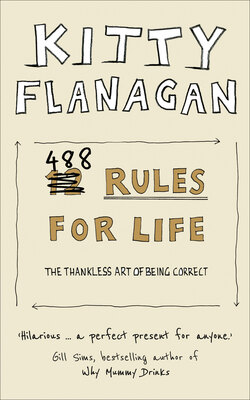Читать книгу 488 Rules for Life - Kitty Flanagan - Страница 27
ОглавлениеA word about the generation gap
Youth-speak is an area of language that changes faster than any other, therefore it’s difficult to make definitive rules about particular words you should or shouldn’t use. That’s because while youths are great inventers of words and phrases, they also dump those words as fast as they invent them. A basic rule of thumb for anyone over forty who wants to avoid looking out of touch is to listen closely to the vernacular of teenagers and then never use any of the words you just heard. Let the youth enjoy their own language, you have lots of other things, like financial stability and Facebook. (Which, of course, you totally stole from the youth because they were forced to drop it once all the parents and unhappy middle-aged married people discovered it and started using it to track down their high school sweethearts.) Act your age and maintain your dignity by sticking with language from your own era. As embarrassing as it may be to refer to something as ‘bitchin’ or ‘bodacious’, at least you just sound old, as opposed to old and try-hard.
Remember, if you have to ask a youth what the word means, you shouldn’t use it. I have listed a few examples here, but this is by no means a definitive list. Also, they were listed at the time of writing, which means that by the time of publication, they may well have disappeared into the vast abyss of discarded youth-speak. The fact that I have heard some of them creeping into use on television suggests they are already out.
Lit. For the record, I don’t know what it means. From the context in which I have heard it used, I gather it is something positive. But that’s as much as I can tell you. And again, it’s not my business to know. I’m well over forty.
* Editor’s note: The word ‘lit’ was recently spotted in a well-known fried chicken chain billboard so it’s safe to say ‘lit’ is now obsolete.
Dropped. Pertaining to music, such as a single or an album. If you grew up in a time when big black circles called records were released and shiny silver things called CDs came out , then you are too old to start telling me that someone’s new album is ‘dropping’. You should also never refer to ‘dropping a beat’. Ever.
Banging. You can’t erase your middle-agedness simply by listening to young people’s radio stations. Sure, you can tune in as a way of staying across current musical trends, but avoid repeating any of the language you hear spoken by the presenters such as ‘Wow, this shit is on fire’ and ‘That song is banging!’ Youth presenters, however, always drop their g’s so it would actually be pronounced bangin’, not that it matters because you won’t be saying it.
Nanginator. This is the name given to the equipment used to ‘do a nang’. Or at least it was for a few days in June 2019. Even though the kids will probably have moved on from doing nangs by the time this book comes out, I feel that the word ‘nanginator’ is so great, it deserves a public airing. If you want to know what a nang is, you’ll have to ask a teenager but if you want to purchase a nanginator, I happen to know they are available at most good kitchenware stores. Ask for them by name.
That said, the youth do not get a free pass on language just because they are young and inventive. There are still some rules and even some words I’d suggest they cut from their lexicon altogether, as you will see in the following section.
